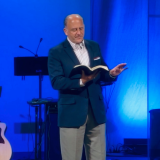Todd Linn's Blog, page 2
March 3, 2025
Cheating On God
If you are married, imagine your spouse taking a few hours of each day to go over to another person’s home, a person of the opposite sex, and spending a few hours alone in intimacy with that person. He or she comes back to you each day and says, “Oh, we’re just friends.” You protest, “Yes, but you are with that person and you expect me to just be okay with it?!” Nearly every one of us understands just how wrong that would be. This sort of “friendship” with others is nothing less than infidelity and unfaithfulness.
God regards our friendship with the world as infidelity to Him. When we are worldly, we are adulterers and adulteresses. You might say we are “prostituting” ourselves. We are sleeping around. We are unfaithful to the One True God.
James teaches that worldliness is, in essence, spiritual adultery. Like a trial attorney concluding his case, James thunders:
Adulterers and adulteresses! Do you not know that friendship with the world is enmity with God? Whoever therefore wants to be a friend of the world makes himself an enemy of God.
James 4:4
Equating worldliness with adultery is a concept rooted in the Old Testament. God is regarded as the Husband of Israel and Israel as God’s bride. To be unfaithful to God is to commit spiritual adultery.
This is the same truth Jesus taught in Matthew’s Gospel: “No one can serve two masters; for either he will hate the one and love the other, or else he will be loyal to the one and despise the other…(Matthew 6:24).” You can’t be faithful to both God and the world. Put another way: you can’t have two spouses.
This truth is developed in the next verse: “Or do you think that the Scripture says in vain, “The spirit 1 who dwells in us yearns jealously”? (James 4:5)
The idea here is that God places within us an inner spirit that is properly satisfied only when we are reconciled to God and only when we find complete satisfaction in God Himself. The NLT has: “God is passionate that the spirit he has placed within us should be faithful to Him.”
James appears to be summarizing the teachings of the Bible on this matter when he refers to “the Scripture.” It’s as though he were asking, “Do you believe the teaching of the Bible to be wrong here—the idea that God has created us for relationship with Him and that we should be faithful?”
When we compromise our convictions and we allow ourselves to be pulled away from God by the tug of the world, then we are committing spiritual adultery. We are allowing the spirit within us to find satisfaction in other “spouses,” things other than God Himself.
Verse 6 points us to the cure for worldliness, a cure, or correction to be developed more fully in the verses to follow. James says, “But He gives more grace. Therefore He says: ‘God resists the proud, but gives grace to the humble.’” (James 4:6)
God is always ready to give grace to those who come to Him in humility. When we come before God with a desire to be faithful to Him and to grow and to find satisfaction in Him, He gives us the ability to live in a way that both pleases Him and blesses us.
When we ask God to disentangle us from the ways of the world, He gives us the grace to be disentangled. We have to ask ourselves, however, whether we really want to be disentangled from the ways of the world.
Do you really desire Him more than anyone or anything? Or do you want it both ways: a little of God and a little of the world? Do you really want a vibrant and committed relationship with God or do you want to “sleep around a bit?” You’re glad to drink from the living water, but you’d also like to drink occasionally from the broken cisterns of muddy water. Know the ease of becoming God’s enemy and beware.
Don’t settle for cheap substitutes of the One True and living God.
**Excerpt from You’re Either Walking The Walk Or Just Running Your Mouth (Preaching Truth: 2020), pages 131-133, available in all formats here.
January 27, 2025
Curbing Your Tongue!
Today, we conclude James’ teaching on the tongue (James 3:1-12). In light of James’ teaching, I’d like to challenge us to do three things this week. May this be our daily prayer as we ask for God’s help:
1) Help Me Think Before I SpeakSomeone 1 has encouraged us to ask the following questions before we open our mouths to speak. Before we say what we’re going to say, we are wise to first ask ourselves:
Is it true?Is it kind?Is it necessary?Does it improve upon the silence?2) Help Me Use My Words To EdifyTo edify is “to build up.” We should always speak in ways that “build up” another person, helping them, rather than “tearing down” that person with our words.
3) Help Me Encourage Others to Do the Same (No Gossip)We help others when we refuse to engage in negative criticism or gossip. We also help others by lovingly correcting them when they speak this way. When a person begins to speak to you this week in a way that is harsh or critical of another person, remind them that Jesus teaches to go to that person directly with their criticism (Matthew 18:15-17). Tell them, “Do as Jesus says. Go to that person directly and share with them.” And be sure that you yourself do the same.
What About You?Do you see an overall pattern of improvement in the use of your tongue? If not, what does this mean, and what will you do about it?How does the secular world operate regarding James’ teaching on the tongue? In other words, do you think successful CEOs speak the way James urges?How can you use your tongue this week to edify a spouse, a child, or another family member?**Excerpt from You’re Either Walking The Walk Or Just Running Your Mouth (Preaching Truth: 2020), pages 114-115, available here.
Prior Comments: directorfsm Back in the day when I was in the US Army, ’74-’94, and long before I was a Christian, I used to have a simple sign that said “STD” I got razzed about it because of another acronym those letters stood for at the time. However mine stood or STOP, THINK and DO! When folks would ask, I would always tell them even opening my mouth without thinking first is a dangerous
directorfsm Back in the day when I was in the US Army, ’74-’94, and long before I was a Christian, I used to have a simple sign that said “STD” I got razzed about it because of another acronym those letters stood for at the time. However mine stood or STOP, THINK and DO! When folks would ask, I would always tell them even opening my mouth without thinking first is a dangerous
 authorTodd Linn, PhDTrue! Btw, love that STD has more than one meaning
authorTodd Linn, PhDTrue! Btw, love that STD has more than one meaning
January 23, 2025
Attributes Of God
A little over four years ago, renowned researcher George Barna released the latest installment of his study on Americans’ theological beliefs. Not surprisingly, the results continue to reflect a downward trend in support of orthodox Christianity.
For example, only 51% of Americans believe God to be the “all-powerful, all-knowing, perfect and just Creator of the universe still ruling the world today,” In contrast, just 30 years ago, 73% of Americans believed that to be true.
In a statement to the Christian Post, Barna observed: “The spiritual noise in our culture over the last few decades has confused and misled hundreds of millions of people.” He added: “The message to churches, Christian leaders, and Christian educators is clear: we can no longer assume that people have a solid grasp of even the most basic biblical principles.”
For this reason (and others!) I’ve been dedicating Thursday posts to “Theology Thursdays.” Each week, we’ll examine one aspect of biblical, orthodox Christian theology and why it matters.
The Attributes of GodAttributes of God from Todd Linn, PhD
Follow Preaching Truth on WordPress.com(function(d){var f = d.getElementsByTagName('SCRIPT')[0], p = d.createElement('SCRIPT');p.type = 'text/javascript';p.async = true;p.src = '//widgets.wp.com/platform.js';f.par...December 16, 2024
Right Doctrine, Wrong Faith
Today’s post continues a treatment of James 2:14-19 and focuses on James 2:19. For a study of the previous verses, see here.
Saving Faith is not Merely Intellectual.Not only is saving faith not merely confessional, but it also is not merely intellectual. James addresses those who may have their doctrine right but again fail to live out that faith in the doing of good deeds. Saving faith, then, is not merely a cerebral or intellectual experience.
Specifically, James says, “You believe that there is one God. You do well. Even the demons believe—and tremble!”
A person can believe orthodox statements about the Christian faith and still be lost. A person can accept true claims about God and still be destined for hell.
The statement: “You believe that there is one God,” is an orthodox Christian statement. There is but one God! So James says, “You do well.” But then he warns: “Even the demons believe (this)—and tremble!”
Even demons believe factual statements about God, but this does not mean that they are in a right relationship with God. Saving faith is not merely intellectual. We are not put into a position of favor with God simply by agreeing with true statements.
True Christian faith, living faith, grips both the head and the heart. Genuine faith is both cerebral and cardiological. If faith is merely intellectual, then it is faith that resides only in our heads. If, however, we recognize the depth of our sin, throw ourselves upon the mercy of our Lord and Savior Jesus Christ, and surrender to Him as Lord, then something has happened on the inside. Something has happened in our hearts. We are different. We are changed. We are saved. And this saving faith leads to the doing of good deeds or works.
The great Puritan preacher and thinker Jonathan Edwards makes this point in a sermon on this verse. His sermon is entitled “True Grace Distinguished From The Experience Of Devils.” 1 Isn’t that a great Puritan sermon title?! Edwards points out that, just like demons, man can know God’s various attributes and remain lost. Here are a few excerpts from the sermon:
The devils know God’s almighty power. They saw a great manifestation of it when they saw God lay the foundation of the earth…and were much affected with it. They have seen innumerable other great demonstrations of his power, as in the universal deluge, the destruction of Sodom, the wonders in Egypt, at the Red Sea, and in the wilderness, causing the sun to stand still in Joshua’s time, and many others…
So the devils have a great knowledge of the wisdom of God. They have had unspeakably more opportunity and occasion to observe it in the work of creation, and also in the works of providence, than any mortal man has ever had…
Devils and damned men know that God is eternal and unchangeable. And therefore they despair of there ever being an end to their misery. Therefore it is manifest, that merely persons having an affecting sense of some, or even of all God’s attributes, is no certain sign that they have the true grace of God in their hearts.
Jonathan edwards
This is James’s warning: one can believe factual statements about God and still be lost. A mere understanding of biblical truths is no guarantee of salvation. It is no guarantee that God’s saving grace is operative in the heart.
Saving faith is not merely confessional and not merely intellectual. But there is more:
Saving Faith is not Merely EmotionalNote the emotion indicated by the demons. James describes them this way: “Even the demons believe—and tremble!”
They shudder, they bristle. They move, they shake. They feel. One could say that when they are in the presence of God, they are very emotional. A lost person can feel awe in the presence of God.
Emotions are part of our being. We all “feel” specific ways in certain situations. Emotions themselves are not problematic. The problem is when we base the authenticity of our faith upon mere emotional experience.
It is dangerous to believe we are genuinely saved simply because we have (or don’t have) an emotional experience of some kind. No one is saved merely because he or she feels a certain way. The fact is there are many days when the true Christian does not necessarily feel very good or very spiritual. Emotions come and go.
A lost person can feel the warmth of a church building. A lost person can feel the care and concern of others. A lost person can feel good when listening to congregational music. He can feel excited, happy, and even good about his spiritual condition.
Saving faith, then, is not merely confessional, not merely intellectual, and not merely emotional.
So, what is a sign that the true grace of God is working in our hearts? We are saved by placing our faith in Jesus Christ alone as Savior. We believe that we are sinners who can do nothing to earn God’s favor. We repent, turning from our sins and turning to Jesus Christ, looking to Christ alone for acceptance with God—Christ’s redemptive work on our behalf. And this genuine faith and trust in Christ alone leads to a different way of living. We are new creations and live out our Christian faith through practical deeds and loving works.
Salvation is not “faith-plus-works,” nor is salvation found in “faith-minus-works,” but genuine living faith is a “faith that works.”
What About You?
Does your faith in Christ involve both “head” and “heart?” If not, or if you are unsure, read the brief appendix at the end of this book: “Becoming a Christian.”How can you use this passage to help someone come to faith in Christ?“Faith alone saves,” but “the faith that saves is never alone.” Do you agree with this statement? Explain and apply your answer.**Excerpt from You’re Either Walking The Walk Or Just Running Your Mouth (Preaching Truth: 2020), pages 87-90, available on Amazon.
Follow Preaching Truth on WordPress.com(function(d){var f = d.getElementsByTagName('SCRIPT')[0], p = d.createElement('SCRIPT');p.type = 'text/javascript';p.async = true;p.src = '//widgets.wp.com/platform.js';f.par...December 13, 2024
What To Say At The Cemetery
A couple of months ago, for “Preaching Post Fridays,” I offered a few suggestions for preaching funerals. Today’s post focuses on a related topic equally crucial to the service itself: what to say at the burial site. Yes, this is a “grave” topic  for pastors to consider while preparing their final remarks. Here are a few ministry principles I have found helpful:
for pastors to consider while preparing their final remarks. Here are a few ministry principles I have found helpful:
Unlike the way Hollywood portrays funerals in popular movies, the entire service does not occur at the cemetery. By the time you reach the graveside, you will have already officiated a service where you shared biographical information and preached the gospel. Because your time at the burial site follows an exceptionally long day for the family, five minutes is generally enough time to bring the day’s events to a meaningful conclusion.
Explain More Than ReadOur brief time at the burial site does not allow for reading and explaining every end-time scripture related to death, the afterlife, and the final state. Additionally, many who gather at today’s graveside are unfamiliar with biblical passages known, loved, and understood by previous generations. Like it or not, many who hear the reading of beautiful passages such as 1 Corinthians 15:50-55 will be confused by phrases about the “corruptible” putting on “incorruption” and “the mortal” putting on “immortality.” To be clear, I’m not suggesting we should never read those passages, but that we can only do so much in a few minutes. Therefore, we better edify those gathered by simply stating the theological truths embedded in those texts.
Teach Clearly About Soul And BodyRegarding the above-referenced 1 Corinthians 15 passage (also 1 Thessalonians 4:13-18 and related texts), preachers should clearly explain what the Bible teaches about a loved one’s body and soul after death. Many who gather at the graveside are often confused about these matters. We help them immensely when we remind them a Christian’s soul goes immediately to be with the Lord at death. We also help them by teaching that a Christian’s body will one day be changed into a glorious or “glorified body” when the Lord returns. For this reason, I like to tell the family that the body of their Christian loved one is being buried at their temporary resting place, awaiting the second coming of our Lord.
Conclude With Encouraging ScriptureAfter explaining theological truth related to soul and body, read an encouraging verse or two that keeps the family’s focus on Christ. Frequently, I use Proverbs 3:5-6 as a way to help the family trust the Lord in the days ahead. I’ll say something like, “Family, I want to read a passage of Scripture for you, and then I’ll pray a prayer that will conclude our time together. I’m reading Proverbs 3:5-6. As I read, listen for how you can trust God in the days ahead.” Then, I read the passage and pray a brief prayer for the family.
November 14, 2024
Creation Introduction
Today’s Theology Thursdays post introduces the doctrine of creation. This brief presentation overviews the five major views of creation and lists a few creationists who founded our understanding of modern science.
So here is today’s SlideShare presentation:
Creation introduction (updated) from Todd Linn, PhD Follow Preaching Truth on WordPress.com(function(d){var f = d.getElementsByTagName('SCRIPT')[0], p = d.createElement('SCRIPT');p.type = 'text/javascript';p.async = true;p.src = '//widgets.wp.com/platform.js';f.par...October 18, 2024
Why Pastors Should Have A Written Wedding Policy
Being asked to perform a couple’s wedding is one of the great joys of pastoral ministry. At the same time, however, pastors may be unprepared when the moment arrives. Here are a few reasons why having a written wedding policy is essential:
1) It Requires Pastors To Develop Their Convictions On MarriageEach pastor must determine where he stands on the issues of marriage, divorce, and remarriage. A written policy forces the pastor to prayerfully study the biblical material and carefully consider his position regarding which weddings he will officiate. While the issues can be complex and controversial, the pastor’s wedding policy ensures he carefully develops his convictions.
2) It Protects Pastors From Impulsive Emotional Decisions Or ReactionsHaving a policy written in advance prevents pastors from making decisions based primarily on feelings. Because pastors understandably want to help, they may quickly agree to officiate a wedding without first asking the couple relevant questions. Similarly, when a couple receives the pastor’s previously written policy from a church secretary or staff administrator, they are less likely to be offended if they disagree with the pastor’s views. A written position before being asked to officiate a ceremony helps remove much of the purely emotional or personal feelings from the equation.
3) It Demonstrates Scriptural FidelityWriting a biblically supported wedding policy demonstrates a pastor’s faithfulness to the Scriptures. Those who read his policy will see the numerous biblical references and passages that inform his views. While some may disagree with the pastor’s conclusions, they must acknowledge he has endeavored to be true to what he believes God has taught in His Word.
4) It Communicates Expectations For Building UseWedding policies also allow pastors to communicate specific concerns about gatherings in the sanctuary or other church buildings. Rules or regulations necessary to the pastor or church should be communicated in writing. For example, if the pastor has a view regarding alcoholic beverages on church property, then his policy clearly states that view. His wedding policy may also refer to other necessary church documents addressing the legal use of church facilities.
5) It Prepares Couples For Meaningful CounselingPastors who want marriages to stand the test of time will incorporate biblical premarital counseling into their wedding policies. Unlike the wedding ceremony, which can often feel rushed or stressful, premarital counseling sessions afford pastors the greatest opportunity to teach gospel truths. While the frequency of sessions and use of the material may vary, a written wedding policy reveals the pastor’s expectations for each couple as they prepare for their wedding day.
October 17, 2024
Angel Of The Lord
Today’s Theology Thursdays presentation continues our look at angelology, the study of angels.
Our focus today centers on what the Bible teaches about the “Angel of the Lord.” Who is the angel of the Lord, and what may we surmise about him?
So, without further ado, here is today’s theological SlideShare presentation:
Angelology 8 (Angel Of The Lord) from Todd Linn, PhDAugust 26, 2024
The Cause Of Temptation
One evening after worship I went into the office of a church I served and made a delightful discovery: someone had anonymously given me an entire box of donuts! There was a nice card, yet nicer still was the variety of donuts in the box: chocolate, vanilla, strawberry-iced, assorted cake donuts and creme-filled donuts. I have a sweet tooth and this gift made my night!
As I recall, most of them were gone before bedtime. I had given at least one away earlier, but my family ate the rest. And when I say, “my family” I mean mostly “me.” Oh I didn’t eat all of them myself, but I ate far more than I should have.
Now I could reason, “Well, you know, I deserved those donuts. After all, they were given to me and the person who gave them intended that I enjoy them.” Yes, but they probably did not intend that I enjoy them all at once.
Truth is, I allowed my desire for something good to be an occasion for temptation. James says, “Each one is tempted when he is drawn away by his own desires and enticed.” My eating too many donuts was not the anonymous giver’s fault. Eating too many donuts was nobody’s fault but my own.

To be sure, my consuming too many donuts may be thought a relatively minor offense, not unlike the little boy whose mother caught him in the kitchen with his hand in the cookie jar. She thundered: “What are you doing?!” And he replied, “I’m fighting temptation!”
With such levity I certainly don’t mean to overshadow the seriousness of greater temptations, I’m just not willing to describe my own in this book. Of this much we may be certain: whatever the source and substance of our temptations, James indicates that the pattern is always the same: “Each one is tempted when he is drawn away by his own desires and enticed.”
In fact, James provides no fewer than three facts we must know about temptation. First:
Know the Cause of TemptationJames cautions: “Let no one say when he is tempted, ‘I am tempted by God.’” In other words, don’t blame God. God is not the cause of temptation. When you are battling temptation, whether it is a temptation to overeat, to drink, to use drugs, to look lustfully at someone, to insult another, to strike another—whatever your temptation—don’t blame God. He is not the cause of temptation.
Not only is God not the cause of temptation, but He Himself “cannot be tempted by evil.” We know this to be true of God if we have a biblical theology of God. The Bible teaches that God is all-sufficient. There’s nothing He needs, nothing He desires, nothing He craves. So God cannot be tempted by evil. He is completely satisfied in Himself and is all-sufficient.
And James adds, “Nor does He Himself tempt anyone.” Why? Because God does not delight in sin. He’s not going to tempt anyone to do evil. He hates evil. God is not the cause of our temptation.
Does this truth keep us from blaming God? No. The “blame game” was played first in the Garden of Eden (Genesis 3). Our first parents (Adam and Eve) played the blame game. They both succumbed to the temptation to eat the forbidden fruit from the Tree of Life. Afterwards, God confronted Adam and Adam blamed Eve. He also blamed God! Remember what Adam said? “The woman…You gave me! She made me do it!” Then God confronted Eve and Eve blamed the serpent.

Will Rogers used to say there were two eras in history: the passing of the buffalo and the passing of the buck. Blaming others, or “passing the buck,” is part of our sin nature. We are, after all, Adam’s children.
No, we cannot blame God for being the cause of our temptation. So who is to blame? James teaches that the cause of temptation does not originate with God, but with us—or better still, within us. He writes that “each one is tempted when he is drawn away by his own desires and enticed.”
Sin is always an inside job. Sin begins in the heart. Each one is tempted when he is drawn away by his own desires, often wrong desires, or misplaced desires. We sin only when we allow ourselves to be “drawn away” by these desires and then “enticed.” We must recognize these desires for what they are and immediately renounce them. If we will do that, we will avoid being “enticed” and led into sin. Therefore, yielding to temptation is nobody’s fault but our own. Rather than blaming our actions on others—including the devil—we must own our actions.
Like the construction worker during his lunch break at the job site. He opens up his lunch box and says, “Oh, no! Baloney sandwich again! Four out of five days this week it’s been a baloney sandwich. If I see another baloney sandwich, I’m gonna be sick!” His construction worker buddy says, “Well, why don’t you ask your wife to pack you something else?” And he says, “Oh, I’m not married. I pack it myself.”
At least he owned his actions!
The cause of temptation is an inside job. We must realize that we have within us the ability to be drawn away by our wrong or misplaced desires. If we yield to those desires, we will be “enticed” and will fall into sin.
Owning our actions is to acknowledge that we can avoid sin. We are not powerlessly drawn away and enticed by something beyond our control. Someone has said, “You can’t keep birds from flying over your head, but you can keep them from building a nest in your hair.” So true!
In a moment we’ll consider behaviors that will help us respond correctly to temptation, lessening the likelihood of our yielding to it. Before we do that, let’s feel the full force of James’ warning by considering a word picture for the words “drawn away” and “enticed.” They are both words that convey ideas from fishing or hunting. They are the same words used to describe the “baiting” of something, like baiting a trap or baiting a fish hook. To be “drawn away” is to be “lured” as by a fishing lure.

Few fish will bite a hook if there’s nothing on it. So if you’re wanting to catch a fish, you cover up the hook with some kind of bait. The bait hides the hook. So the fish comes along and sees the bait. He doesn’t see the hook. The fish swims up to the bait and finds the bait attractive. The fish is “drawn away by his own desires and enticed.” The fish has taken the bait. And what does the fish now discover? Underneath that bait is the snare of the hook. And all at once it is all over for the fish. Too late to turn back. The hook is set and the fish is caught.
It’s one thing to talk about fish and quite another to talk about men and women, but the pattern is the same. Once we allow ourselves to be drawn away by our desires, it is just a matter of time before the hook is set and we have entered into sin.
**Excerpt from You’re Either Walking The Walk Or Just Running Your Mouth (Preaching Truth: 2020), pages 28-32, available on Amazon.
Follow Preaching Truth on WordPress.com(function(d){var f = d.getElementsByTagName('SCRIPT')[0], p = d.createElement('SCRIPT');p.type = 'text/javascript';p.async = true;p.src = '//widgets.wp.com/platform.js';f.par...July 25, 2024
Salvation In The Old Testament
Today’s Theology Thursdays post continues our systematic theological treatment of soteriology (the study of salvation). In this post, we’ll examine what the Bible teaches about how believers were saved during Old Testament times.
Of course, salvation in the Old Testament occurs the same way as in the New Testament. We are “saved by grace through faith . . . not of works” (Ephesians 2:8-9). But how does this all work since Jesus didn’t come till 2,000 years ago?
If you’re pressed for time, you may wish to jump to the helpful graphic on Slide 15. Blessings!



